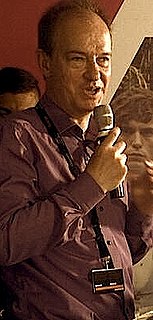A Quote by Shane Carruth
I'm only interested in science fiction that's used as a literary device, a shortcut into something more exploratory or universal about our experience. That's why I think it was invented and why mythology was invented; it's a tool, not an end to itself.
Related Quotes
Science fiction is a weird category, because it's the only area of fiction I can think of where the story is not of primary importance. Science fiction tends to be more about the science, or the invention of the fantasy world, or the political allegory. When I left science fiction, I said "They're more interested in planets, and I'm interested in people."
Science fiction [is] the kind of writing that prepares us for the necessary mutations brought about in society from an ever changing technological world and as a result. The mainstream hasn’t excluded SF; the mainstream has excluded itself. No one told Jules Verne he was a science fiction writer, but he invented the 20th century.
We invented marriage. Couples invented marriage. We also invented divorce,mind you. And we invented infidelity,too, as well as romantic misery. In fact we invented the whole sloppy mess of love and intimacy and aversion and euphoria and failure. But most importantly of all, most subversively of all, most stubbornly of all, we invented privacy.
I can think of very few science books I've read that I've called useful. What they've been is wonderful. They've actually made me feel that the world around me is a much fuller, much more wonderful, much more awesome place than I ever realized it was. That has been, for me, the wonder of science. That's why science fiction retains its compelling fascination for people. That's why the move of science fiction into biology is so intriguing. I think that science has got a wonderful story to tell.
There is no good trying to be more spiritual than God. God never meant man to purely spiritual creature. That is why He uses material things like bread and wine to put the new life into us. We may think this rather crude and unspiritual. God does not: He invented eating. He likes matter. He invented it.
It remains a mystery to me why some of that [pulp] fiction should be judged inferior to the rafts and rafts of bad social [literary] fiction which continues to be treated by literary editors as if it were somehow superior, or at least worthier of our attention. The careerist literary imperialism of the Bloomsbury years did a lot to produce fiction's present unseemly polarities.
Sunshine takes its intelligent and honourable place in the history of grownup science fiction on the screen and on the page: a genre that seeks to break free of parochialism and think about where and why and what we are without the language of religion... I loved Sunshine for its radical proposal that humans can and will do something about a catastrophe, and that our weapons could be used up in the service of preservation.
The Booker thing was a catalyst for me in a bizarre way. It’s perceived as an accolade to be published as a ‘literary’ writer, but, actually, it’s pompous and it’s fake. Literary fiction is often nothing more than a genre in itself. I’d always read omnivorously and often thought much literary fiction is read by young men and women in their 20s, as substitutes for experience.





































